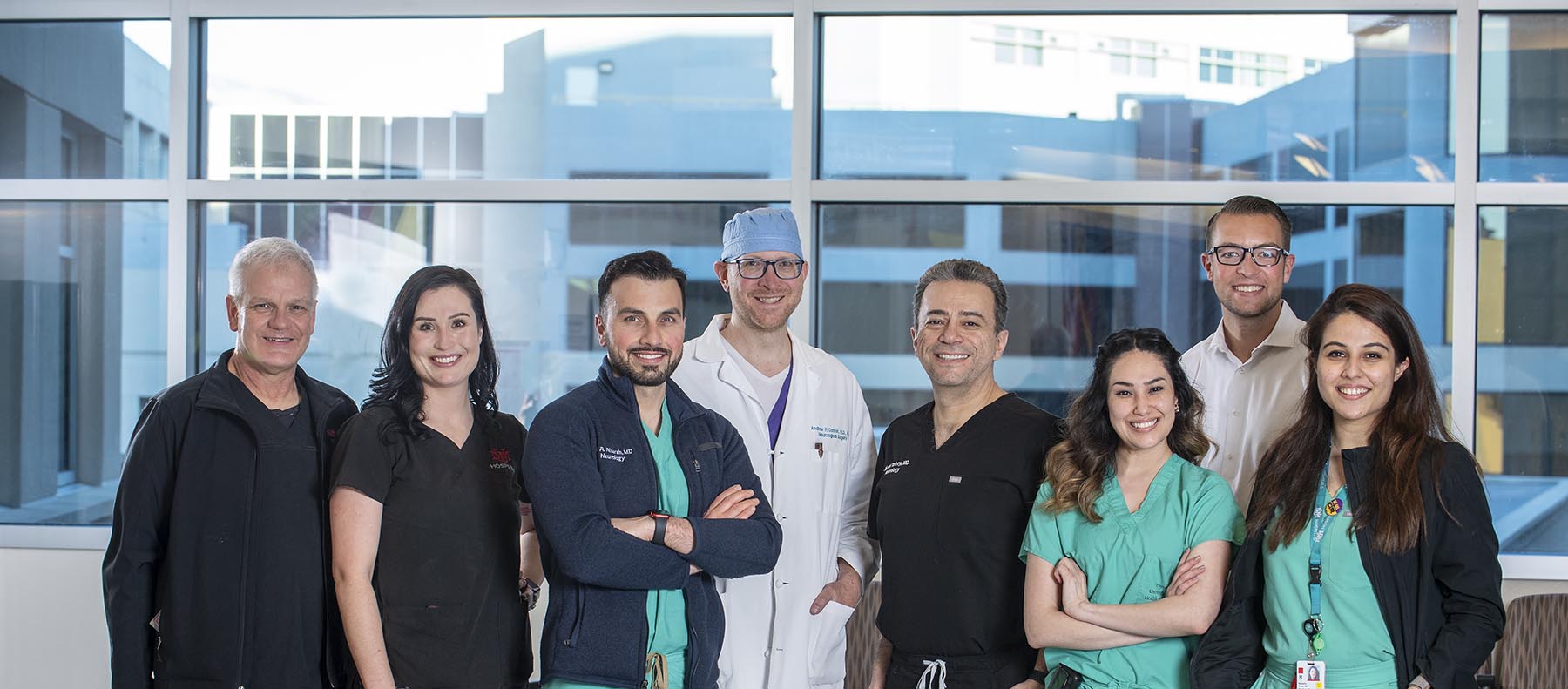As of May 5, 2022, the University of New Mexico Health Sciences Center’s Department of Neurology became one of only five programs in the U.S. to receive Accreditation Council for Graduate Medical Education (ACGME) for its neurosciences critical care fellowship training program.
We join the University of Pittsburgh, Stanford University, Baylor College of Medicine and Montefiore Medical Center in this prestigious group. While most of the accredited schools are in large cities with multiple academic medical centers, we look forward to welcoming trainees to New Mexico for a unique fellowship experience of a diverse patient population and being the only Level I Trauma Center and Comprehensive Stroke Center for the state.
Neurocritical care is a broad practice that has been recognized for more than 30 years. Neurointensivists specialize in providing and coordinating general and neurological care in the intensive care unit (ICU) for very ill patients with a variety of brain, spinal cord and peripheral nerve injuries.
The neurocritical care fellowships accredited by ACGME will unlock funding opportunities and provide for two fellows at UNM Health Sciences Center who will specialize in neurological diseases and critical care.
Since 2007, the United Council on Neurological Subspecialties (UCNS) has been accrediting neurocritical care fellowships. The council was incorporated in 2003 to, in part, provide a pathway for smaller specialties to be recognized. Since neurocritical care was at that time a small subspecialty, this was the accreditation choice by the Neurocritical Care Society.
In 2019, when I arrived at UNM HSC, there was not a fellowship program for neurocritical care. But, having many years of experience being a program director, it was clear that the unit had all the components to create one. With the support of the department, critical care center and GME offices, we were able to quickly become UCNS accredited. But I knew the opportunity would be coming in a few years for the ACGME accreditation, and we prepared to be ready to apply as soon as the option became available.
Journey to Accreditation
The stage was set for UNM HSC to seek ACGME accreditation when Dr. Torbey arrived in 2017. At the time he was also president of the Neurocritical Care Society and set his sights on achieving ACGME accreditation for fellowships in the subspecialty.
Following his lead, directors of other critical care programs came together, including internal medicine, anesthesiology, emergency medicine, neurosurgery and more. Together they crafted the outline of the fellowship, the certifying exam, the timing of the program rollout and more critical details.
When the first certifying exam was offered in October 2021, sponsored by the American Board of Psychiatry and Neurology (ABPN), several UNM HSC faculty members passed and earned certification. This important step allowed us to move forward to in preparing for the ACGME application of program accreditation.
Our collaborative team worked closely to assemble the exhaustive requirements for accreditation, including identifying core educational faculty, creating curriculum components, determining systems for evaluation of fellows and much more.
We were thrilled to learn out program was among the first accredited. Achieving Dr. Torbey’s dream is much more than personal satisfaction. It establishes UNM Health Sciences Center as a wellspring of talent, launching some of the best, most diversified neurointensive training available in the central U.S.
Exceptional Neurointensivist Training
Two fellows per year will join us for the two-year program, training in our dedicated, 24-bed neurosciences critical care unit. UNM Hospital is home to the state’s only comprehensive stroke center, only academic medical center, and only Level I Trauma Center—the highest verification by the American College of Surgeons.
Neurointensive care fellows will see a wide variety of patients with neurological and neurosurgical pathologies. We diagnose, stabilize, and treat 7,000 critically ill or injured patients annually. Our patient population is racially and ethnically diverse and includes the indigenous people and Native Americans of New Mexico and surrounding states.
About the Program
The Neurocritical Care Fellowship curriculum is tailored to the trainee and will depend in part on their background. Our program has been vetted for excellence in selecting candidates. Similarly, the program will have ongoing curricular oversight, ensuring trainees receive the highest quality education and are properly evaluated.
Our goal is for UNM HSC to train exceptional neurointensivists, who become leaders here or at other regional or national medical centers. Being an excellent neurointensivist is, in part, about communication and empathy. It is critical to communicate potentially life-altering information with expertise and emotional intelligence—our fellows will receive top-tier training in both.
Typically, ACGME requests annual patient evaluations of trainees as part of its regular oversight of fellowship programs. Neurocritically ill patients, however, are often unable to complete these evaluations due to their conditions. Fellows in our program will instead be evaluated by the family members of patients, providing them an opportunity to weigh in on the quality of our program.
Related reading: A Day in the Life of a Neuro ICU Resident
What this Means for Patients
As the only ACGME-accredited neurocritical care fellowship program in the central U.S., we anticipate drawing the best and brightest minds from the region to our first-class facilities and beautiful community.
For patients, this reinforces our promise of providing only the best care based in the latest research and technology. As an academic medical center, these values have always been important—now that we are ACGME official, we will have public accountability to stay at the forefront of expertise in neurocritical care.
Application Period Opens February 2023
The application period for fellowships beginning in July of 2024 will open in February of 2023. View our website for details about the application process, which is part of the San Francisco match. The site also includes example curricula, education and goals information, benefits, and more.

